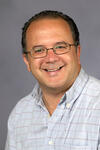In The News: College of Sciences
Caves in Nevada can tell scientists about the history of the climate in the West and what it might look like in the future.

Despite being located in the hot and dry Mojave Desert, Nevada is home to 52 fish species found nowhere else in the world.

Tom Gordon of Carson City didn’t expect his backyard to become an excavation site when he starting planting trees this summer, but that’s what happened after he found what looked like an animal graveyard.

Tom Gordon of Carson City didn’t expect his backyard to become an excavation site when he starting planting trees this summer, but that’s what happened after he found what looked like an animal graveyard.

Steve Rowland, paleontologist and professor of geology at UNLV, discusses the Ice Age fossils recently extracted from private property in Carson City, at the Las Vegas Natural History Museum in Las Vegas.

A meme is circulating on the Internet comparing the statement “once COVID-19 is over” to the wishful possibility of winning the lottery.
United States authorities are trying to eradicate Asian giant wasps , which are often dubbed killer wasps . However, the wasp which was first reported to appear there at the end of 2019 is feared to spread throughout the country and become a permanent species.

In response to your July 27 story, “New study may predict ‘worst case’ climate scenario for Nevada’”: I read this report with alarm. Every disaster movie starts with a scientific warning being ignored, and we ignore this study at our peril. Like ignoring the early coronavirus warnings, not following advice from climate scientists creates disasters, too.

Meet the UNLV scientist and professor who's literally doing some groundbreaking work on Mars with NASA - National Aeronautics and Space Administration.
Asian giant hornets have the potential to spread across the United States and establish a permanent presence in the country, experts have told Newsweek.
If the Mars Perseverance Rover was lifting off from Cape Canaveral at almost any other time, University of Nevada, Las Vegas geochemistry and astrobiology professor Elisabeth “Libby” Hausrath would have had a front-row seat.

If the Mars Perseverance Rover was lifting off from Cape Canaveral at almost any other time, University of Nevada, Las Vegas geochemistry and astrobiology professor Elisabeth “Libby” Hausrath would have had a front-row seat.





